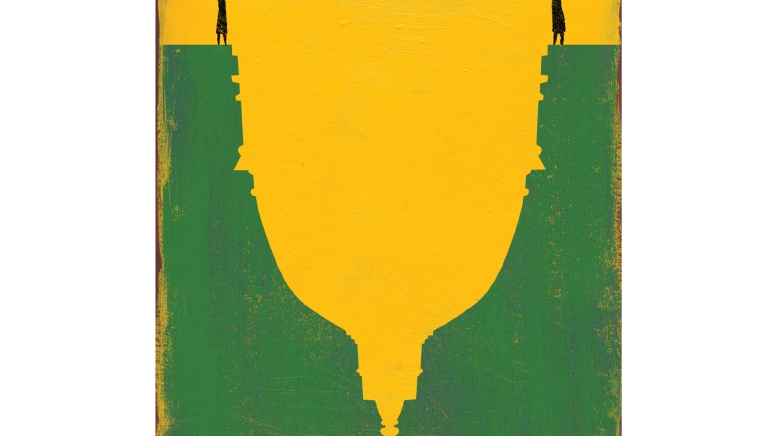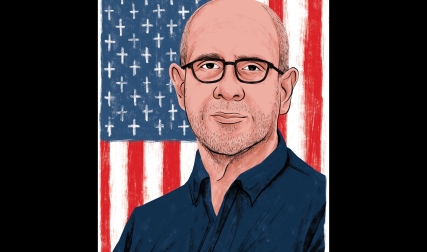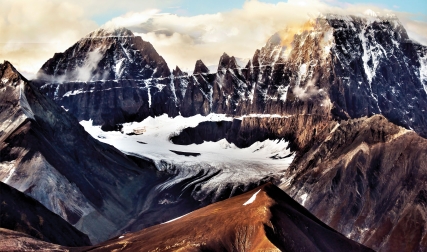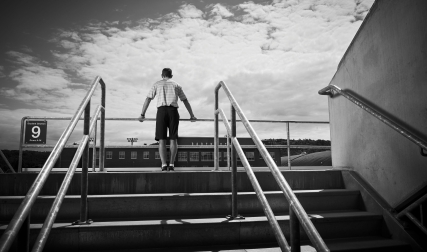Washington Post contributing columnist Kate Cohen ’92 has much in common with Christian pastor and cancer survivor Molly Baskette ’92: They’re classmates, mothers, and authors. But one believes in God, and the other doesn’t. They recently got together for a spirited discussion about Baskette’s memoir, How to Begin When Your World is Ending: A Spiritual Field Guide to Joy Despite Everything and Cohen’s We of Little Faith: Why I Stopped Pretending to Believe (And Maybe You Should Too).
MB: A lot of the reason I write is to find out what I’m thinking and feeling and ideally to grow and become more of a mature person, to heal wounds: my own and others’.
KC: And a big goal of my book is to show that you can be a thoughtful, intellectually rigorous atheist, with warmth, and without a sense that other people must give up their beliefs. My main concern is that people who don’t believe feel comfortable being honest about that.
MB: You write that God is not provably real, and I heartily agree. But there’s an impression in there that God is not real because it’s not provable. That’s a sticking point for me. As Mahalia Jackson sang, “Yes, God is real, for I can feel him in my soul.” God has become real for me, and more to the point, I’ve become more real myself, by being loved by God and by others.
KC: I hear you. That’s a useful thing to believe, but nothing you’ve said makes me think God is real outside your heart and your head. I have two core beliefs. One is that there is no God beyond human invention, and the other is that—given this—it is our responsibility to take care of people and the earth. I think you agree with the latter.
MB: Yes, absolutely.
KC: Another goal with my book and my column is to make people see things just a little bit differently and then go back to their lives a little bit changed. This is probably true for you too, with your sermons and your books.
Hating on atheists is one of the last publicly acceptable prejudices in our society.
MB: Both of our books are intended to help us stop flying by old maps, to free us from the script society gives us about God—in one direction or another. Neither one of us is trying to proselytize, but my book is a little more emotional, maybe a little more manipulative. “Appealing to the limbic brain” might be a nicer way to say it.
KC: I was really gripped to read about some of the things that you’ve gone through and the grace with which you have gone through it all. Not just your cancer but also your brother’s death.
MB: And you are so brave on so many levels to take your stand publicly. Hating on atheists is one of the last publicly acceptable prejudices in our society.
KC: I’m far braver in print than I am in person. Many people think that atheists are amoral, unemotional, and materialistic—all these things that have nothing to do with whether or not you believe there’s a supreme being. The perception is that atheists are angry and like to belittle others. I’m clearly none of those things, and I think the people who share my beliefs should make an effort to make that clear, because otherwise that stigma is going to remain. Only 81 percent of Americans say they believe in God—one study shows only 74 percent—but only 4 percent call themselves atheists publicly. I wanted to tell the story of my evolution and getting to the place where I was comfortable saying, “No, I don’t believe in God,” and teaching my children that God is a human invention.
MB: We overlap in feeling that other people think that we think we’re better than them, that we’re somehow more morally perfect or less human. One of my anxieties going to seminary was: “Does this mean I can’t drink or swear or that the next person I date has to become my spouse for the rest of my life?” Pastors try to live up to the standards that God has set for us. It doesn’t mean we can do anything we want. But we are fully human and no better than anybody else.
I don’t have a beef with atheists—my church is in Berkeley, California, and half my congregation are probably functional atheists. If we excluded anyone on the basis of not believing, it’d be crickets. What I have had difficulty with through the years are atheists who are supercilious and mean-spirited about their atheism, almost zealous, and feel the need to take something away from me to prove a point. It feels like there’s no poetry to their worldview. This is partly why I love church, where there is so much poetry, so much wonder.
KC: I do want to have some of the beautiful things that religion has built and brought into people’s lives.
MB: You write about people needing home and temple. Even atheists need that. Everyone needs that. I talk a lot to my congregation and anyone who will listen about the protective mental health factors of having a community of faith or just any kind of a structured community that has norms and rituals but soft boundaries as well.
KC: You reached a point when you were done with chemo and you were released back into the wild. And then is it a weird letdown? You seemed to be struggling a little bit with the fact that you felt closer to big truths about life and death, and yet….
MB: It’s like that Buddhist quote, “Illumination, then the laundry.” It is very much like that—unless you can find a way to stay on the mountaintop, which you can only do if you don’t have children and responsibilities and are independently wealthy and own a mountain. The rest of us have to keep on living.
Which is not to say that I shouldn’t strive to live with a greater sense of gratitude or a new lease on joy. I don’t believe, as some Christians might, that God kept me alive for a purpose. To say, “God kept me alive for a purpose,” is too much pressure to put on myself for the next however long I have left to live. But does God want me to turn the suffering I went through under the soil, to compost it and enrich it? Yes. One of my catchphrases from the book is, “God didn’t send the disaster, but God will use it.”
KC: You don’t see God as just a creator?
MB: No. I see God as involved, but not controlling and not able to do everything. Theodicy asks: If God is good, why is the world so hard and why do terrible things happen? The original title of my book was going to be God Is Not an Asshole, but my agent and publisher decided that wouldn’t fly. If God is not an asshole, then God is also not all-powerful, able to decide which young mothers get to survive cancer, which people die by wildfire in Maui. God has given up a certain amount of agency. It’s a mystery, and I know that can be very unsatisfying.
Yet God giving up agency means we get some: to do good or do ill, to notice the invitation every day to live with more joy, more love.
KC: I love your original title. It’s helpful to think that God is not an asshole. People want their God to be a good being. You’re a beautiful and good person, so you’ve created a beautiful and good God who didn’t make the disasters but helps you through them. (I think you should know that one of my discarded titles was Sorry, Honey, God Is Just Pretend, which is an actual thing I said to a child one day.) But I’m with you on making meaning. I think we share an attraction to meaning-making.
MB: I mean, we were both comp lit majors.
KC: It was the best major! It forced you to do your own thinking. You had to take two sometimes very different things and show how they were connected.
MB: Which is not altogether different from what faith does for me. Religion literally means “the ties that bind.” Spirituality helps me see what to grab onto so I can make my way. It’s like being in a library with a secret door. If you know where the handle is, you know how to get into the next room. But if you don’t know, all you’re seeing is bookshelves. I don’t mean to privilege belief in God over atheism. It’s just that belief allows me to see how to find a way through a certain passageway or find handholds to climb up a smooth rock wall.
KC: I don’t feel that I lack handholds. If we are both seeking meaning, trying to be decent and open to other people, the fact that you’re a believer and I’m not a believer doesn’t really matter. I’m fascinated by religion and interested in things we can bring into our lives from the religious realm without having to subscribe to a set of beliefs that we don’t agree with.
MB: One place I know for sure we differ is life after death. I don’t know what happens after we die. I have ideas, because of a near-death experience that I wrote about in my book. I believe we can’t ever become nothing. Our energy persists, whether we are fully ourselves, inhabiting our personalities, or something more inchoate. As much as I would like to think and experience reunion with those we love who have died, I’m not sure that is waiting for us. My near-death experience was a pretty typical one, ya know, “absolute peace, freedom, unity with all created things.” But I’m not willing to foreclose on any reality. I just know there’s a possibility that we persist.
KC: I think that it’s pretty clear, when you look at a dead body, what happens after we die. We end, and we turn back into just matter and that matter ultimately deteriorates. I think it’s fun to think about all the possible post-death scenarios, but I don’t think there’s any reason to believe any of them. Is there an invisible part of us that persists in some way? I don’t think so.
But I do feel the two of us are more alike than we are different. I found your book so illuminating. I haven’t built a church, but I’m also trying to show people how you can build a life and raise kids in a meaningful, honest way—even if you don’t have religion or believe in an animating deity. A lot of people don’t, but they go through the motions because they think they’re supposed to. My book is a plea for honesty—especially within the context of the increasing power of the religious right in this country.
MB: Which is absolutely terrifying. We share a horror of Christian nationalist theocracy beating its drum and doing its best to kill our pluralist democracy. I was shocked to read in your book that there are laws still on the books in some states that say you can’t hold certain offices if you don’t believe in God. It’s galling.
KC: I believe in humanity and in what people can do and in art and what people can achieve. And it’s not that my head isn’t filled with incredible fictional characters whose beliefs and philosophies inspire me. It’s just that I don’t think that they actually exist.
MB: And that’s why I love your book, because you don’t think they exist, but you’re not a party pooper. You have so much joy and delight.
KC: Well, I’m having fun. Telling stories, wrestling with ideas, playing with words—what lucky people we are to get to do that.
MB: Amen!




